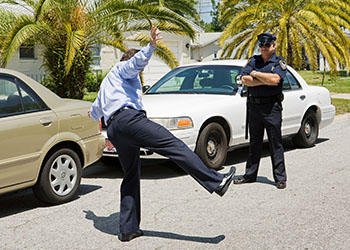The Pseudo-Science of Field Sobriety Testing
May 6, 2024
 In a world that's always advancing scientifically and technologically, it's frustrating how certain traditional methods persist despite lacking solid proof. One example is the field sobriety test (FST) used by Colorado police to check if someone is impaired while driving. How reliable are these tests?
In a world that's always advancing scientifically and technologically, it's frustrating how certain traditional methods persist despite lacking solid proof. One example is the field sobriety test (FST) used by Colorado police to check if someone is impaired while driving. How reliable are these tests?
As a seasoned criminal defense lawyer at Watkins Law Firm LLC in Boulder, Colorado, I'm ready to stand by you and challenge your DUI charge. Serving nearby areas like Longmont, Louisville, Lafayette, and Broomfield, you can count on me to support you. If you need representation in DMV hearings, reach out to me today for a free consultation.
A Background of Field Sobriety Testing
I have spent the last 20 years defending my clients against DUI charges. I have seen firsthand the shortcomings of FSTs in DUI charges. What you need to understand is that field sobriety tests are far from the precise science they're often portrayed as.
How Did Field Sobriety Tests Evolve?
Field sobriety tests were developed in the 1970s by the National Highway Traffic Safety Administration (NHTSA) to standardize methods for detecting driving under the influence of alcohol. And while they may be standardized, it doesn’t make them infallible.
The tests include the Horizontal Gaze Nystagmus (HGN), the Walk-and-Turn (WAT), and the One-Leg Stand (OLS).
Horizontal Gaze Nystagmus (HGN) Test
This test involves an officer moving an object horizontally with their eyes to watch for involuntary jerking, which can be a sign of intoxication. However, numerous factors besides alcohol consumption, including medical conditions like nystagmus, and certain medications, can lead to false positives.
Walk-and-Turn (WAT) Test
During this test, a suspect is instructed to take nine steps, heel-to-toe, along a straight line, then turn on one foot and retrace their steps. The officer is looking for eight indicators of impairment. The problem here is that you could be perfectly sober and still struggle with balance and coordination due to various factors, unrelated to alcohol consumption.
One-Leg Stand (OLS) Test
The one-leg stand test requires a suspect to stand with one foot approximately six inches off the ground and count aloud by thousands until told to put the foot down. Again, balance can be influenced by many factors unrelated to alcohol, such as age, weight, or pre-existing medical conditions.
The Question of Reliability
As you can see, field sobriety tests are fairly subjective; the determination of failure or success depends largely on the officer's interpretation. It's honestly concerning how such subjective measures are considered key evidence in DUI cases, especially with the harsh penalties involved if someone’s convicted.
Studies sponsored by the NHTSA itself found that even when administered correctly, the tests do not definitively indicate intoxication levels corresponding to the legal blood alcohol concentration (BAC) limit of 0.08%. For instance, the HGN test is the most accurate of the three, predicting a BAC of 0.08% or greater 88% of the time when performed under ideal conditions. However, "ideal conditions" rarely exist on the roadside, at night, under stressful circumstances.
Also, factors like nervousness, fatigue, injury, or even footwear can impact a person's performance on these tests, irrespective of alcohol consumption.
This brings us to a critical point: the pseudo-scientific nature of FSTs and their questionable application in reliably identifying intoxicated drivers makes space for DUI lawyers to build a robust defense against DUI charges.
Defending Against FST Results in Court
Recognizing the limitations of field sobriety tests is essential when contesting DUI charges. These include:
The exact conditions of the testing environment.
How detailed the instructions provided by the officer were.
The suspect’s medical history and physical condition at the time of the test.
The officer's training and experience in administering FSTs.
By pointing out these things, I am showing how field sobriety tests might not always be reliable proof that someone is intoxicated. It's about explaining how tricky these tests can be and pushing for a better understanding of how they fit into DUI cases.
A More Informed Perspective on FST Tests
The gist of the matter is that while FSTs make sense on paper, but in the real world, it's a whole different ballgame. Picture this: you’ve had a long day, you’re tired and stressed, and the officer pulls you over and asks you to perform these circus acts. You may not perform well, even with little to no alcohol in your system.
I believe that field sobriety tests have their place in DUI enforcement, but they shouldn't be taken as definite proof of being intoxicated. The science behind them is iffy at best, so it's important to question how they're used and understood.
Just remember, law and science are closely connected. Field sobriety tests are part of this connection, showing why we need to keep studying and improving them based on real evidence. It's all about making sure justice is fair for everyone.
Your Legal Ally Against DUI Charges
If you're facing DUI charges based on an FST, remember they're not the final word. There are legal options to challenge them and question their reliability. I am dedicated to giving you a strong defense that considers all the details of your case, ensuring that true justice, backed by solid science, wins out.
At Watkins Law Firm LLC, my team and I have seen too many people blindsided by the "science" of these tests. Our job is to dig into all possible avenues and to challenge the idea that these tests are not foolproof. And, let’s be honest, there's plenty to challenge.
If you find yourself in a tight spot based on one of these tests, give me a call. There's always a way to fight back, and I’m here to help with that.
